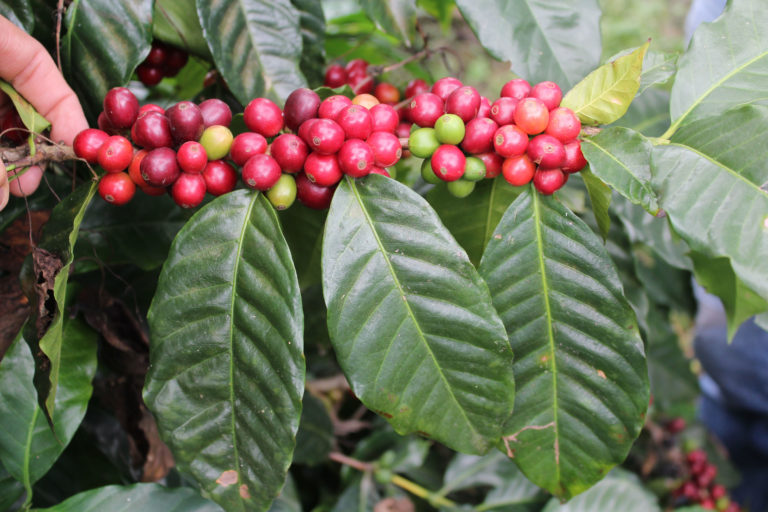The difference between organic coffee beans and coffee beans. What do you mean by good organic coffee beans?

Professional coffee knowledge exchange more coffee bean information please follow the coffee workshop (Wechat official account cafe_style)
Organic coffee beans
What are organic coffee beans?
Organic Coffee Organic Coffee and authorized Organic Coffee Certified Organic Coffee is licensed by a third party and is grown without chemical raw materials without pesticides, pesticides, herbicides and artificial food additives during the growth of coffee trees. The detection, planting, cultivation, harvesting and production of soil water quality must meet the organic conditions and the process must be strictly controlled. It is a high-quality coffee produced in harmony with nature, which is of great benefit to health and environmental protection. Only a small part of the world's coffee is truly organic certified coffee, because the certification process takes a long time, about three years. And such a deal could reduce coffee production by as much as 50%. So when coffee growers decide to do organic certification, it means that a time-consuming and costly investment begins.
Characteristics of organic coffee beans
Organic coffee does not use any insecticides or other chemicals to treat pests or cultivation problems, but uses natural methods, such as natural composting, hedgerows, pruning, etc., to maintain the growth of coffee trees; use all-natural biological control methods in pest control, such as planting protective trees, and use various other natural farming techniques to ensure the health of coffee trees. Because the sustainability of land, water and the natural ecological environment is an active concern of the organic coffee industry. Organic high-quality coffee is a masterpiece of heaven, earth, and man-weather, soil, and love. It takes five years for a coffee tree to blossom and bear fruit. A pound of coffee needs about 4000 coffee beans, which are harvested manually. Each coffee tree harvests only enough coffee fruit a year to produce a pound of roasted beans, which is rare.
The current situation of the global coffee industry
As the second largest commodity in the world after oil (New York Futures Exchange-Arabica; London Futures Exchange-Robsta), coffee ranks first in the world in a single food category and beverage category.
For three consecutive years, the futures price of Arabica coffee continues to decline, while labor costs are increasing year by year, so the viability of non-brand raw materials coffee beans is worrying.
In the past five years, China ranks ninth in Arabica coffee production, with a total output of 132000 tons. At the top of the list is Brazil, which has a capacity difference of more than ten times that of Brazil, which is the second largest producer of Robusta in the world.
As shown above, the output of Colombia ranks second in Arabica species in the world, and it is the most worthy object to pursue and learn from Yunnan coffee producing areas in our country. first of all, the average quality and average price of Colombian coffee are better than ours. Secondly, their production capacity is 5-6 times that of ours.
Including Robusta, the total annual output of Brazil is 3.43 million tons, Vietnam is 1.79 million tons, and Colombia is 880000 tons. Colombia, like China's Yunnan, only produces Arabica species but not Robusta species. China's total output of coffee is 132000 tons, ranking 13th in the world.
As shown above, the orange part belongs to the coffee growing zone with a better environment in the equatorial region, while the white part is among the top 10 coffee consumers in the world, of which the top one is Europe-2.66 million tons, which is currently the largest coffee export region in Yunnan. In terms of a single country, the United States ranks first with 1.51 million tons, while Japan ranks first in Asia with 490000 tons, with Chinese mainland consumption of 187000 tons, ranking ninth in the world.
END
Important Notice :
前街咖啡 FrontStreet Coffee has moved to new addredd:
FrontStreet Coffee Address: 315,Donghua East Road,GuangZhou
Tel:020 38364473
- Prev

What are the advantages and disadvantages of coffee partners? How harmful is the fat plant powder of coffee companions?
Professional coffee knowledge exchange more coffee bean information Please follow the coffee workshop (Wechat official account cafe_style) there are many benefits of drinking coffee, drinking a cup of coffee in the morning or when you are tired at work can refresh you, drinking a cup of coffee after a meal can help digestion, remove edema, and achieve the effect of weight loss. And this is limited to black coffee without any addition, but you add too much
- Next

What are the flavor and taste characteristics of Yunnan small coffee beans? Introduction to the ranking and price grade of Yunnan boutique coffee brands
Professional coffee knowledge exchange more coffee bean information Please pay attention to the coffee workshop (Wechat official account cafe_style) drank African beans, rich fruit and flowers; drank American beans, sweet taste, sour up bright. Have you ever tasted Chinese beans? Small grains of coffee from Yunnan, China is one of the few suitable in China.
Related
- Beginners will see the "Coffee pull flower" guide!
- What is the difference between ice blog purified milk and ordinary milk coffee?
- Why is the Philippines the largest producer of crops in Liberia?
- For coffee extraction, should the fine powder be retained?
- How does extracted espresso fill pressed powder? How much strength does it take to press the powder?
- How to make jasmine cold extract coffee? Is the jasmine + latte good?
- Will this little toy really make the coffee taste better? How does Lily Drip affect coffee extraction?
- Will the action of slapping the filter cup also affect coffee extraction?
- What's the difference between powder-to-water ratio and powder-to-liquid ratio?
- What is the Ethiopian local species? What does it have to do with Heirloom native species?

